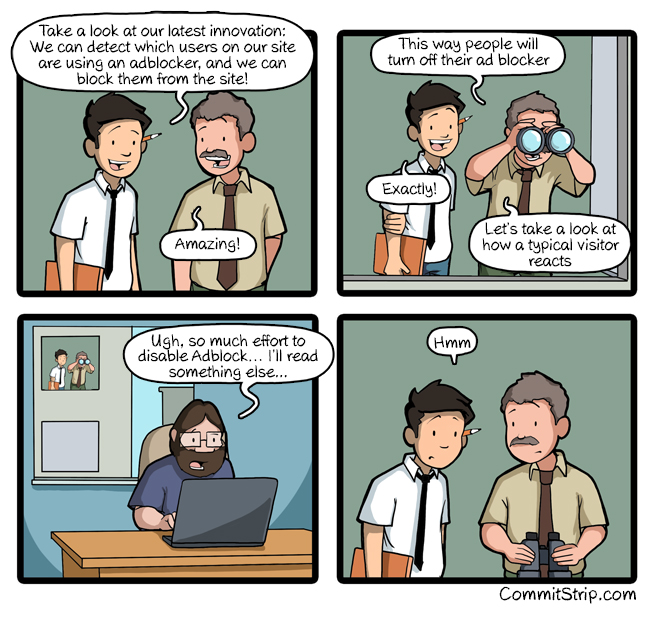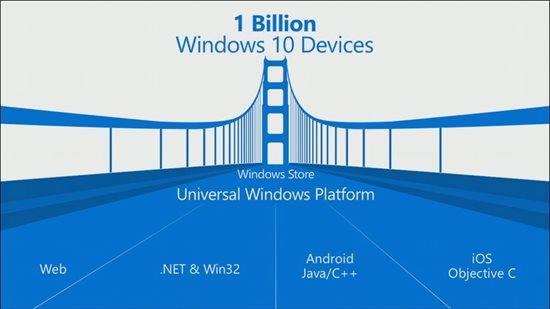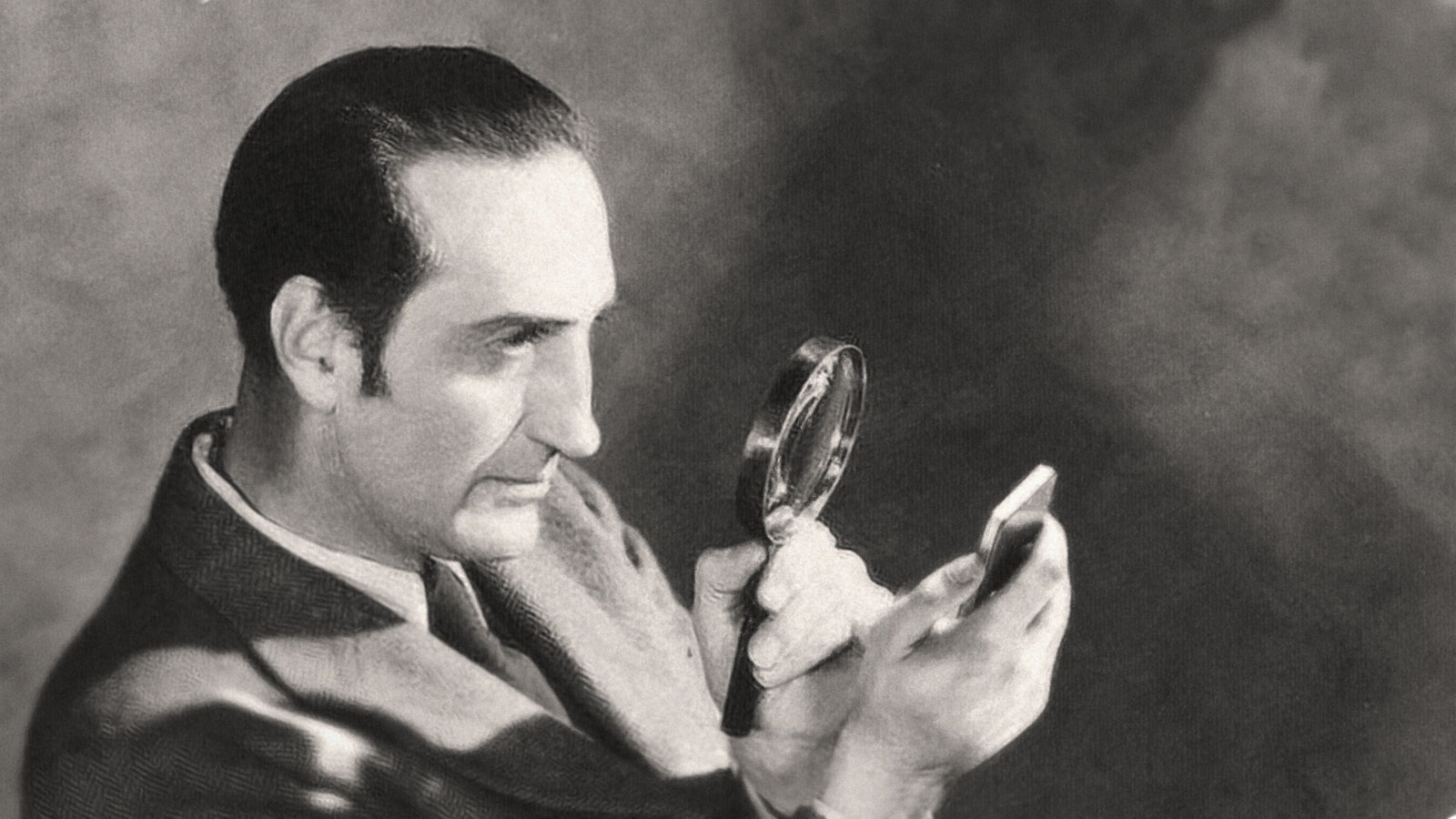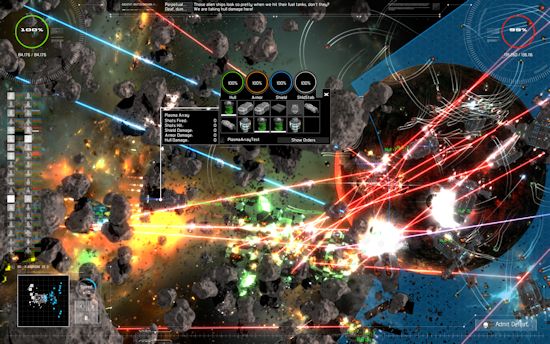
Markku.lempinen
Shared posts
The latest innovation from the media
Markku.lempinenPretty much, yes :p
Watch a hydraulic press crush Barbie
Markku.lempinenUnplaceable but heavy accent? Hmmm... He sounds very much like a Finnish rally driver :D

On YouTube, a gentleman with an unplaceable but heavy European accent crushes things with his hydraulic press. Above, he crushes Barbie. ("Beautiful… but for how long?") (more…)
Microsoft pushes ads for Windows 10 in a security update
Markku.lempinenI just can't wrap my mind around this pos...
French Parliament votes to imprison tech execs for refusal to decrypt
Markku.lempinenI refuse to believe that even the cheese-eating surrendermonkeys are idiotic enough to pass something like this...

Amendment 90 to France's penal reform bill provides for five year prison sentences and €350,000 fines for companies that refuse to accede to law enforcement demands to decrypt devices. (more…)
Epic CEO: “Universal Windows Platform can, should, must, and will die”
Markku.lempinenI approve of his message. Anything by MSFT should die, in general.

In a scathing editorial in the Guardian, Epic Games co-founder Tim Sweeney has spoken out about Microsoft's Universal Windows Platform (UWP) initiative, calling it a "fiasco" and "the most aggressive move Microsoft has ever made."
"With its new Universal Windows Platform (UWP) initiative, Microsoft has built a closed platform-within-a-platform into Windows 10, as the first apparent step towards locking down the consumer PC ecosystem," says Sweeney. "Microsoft has launched new PC Windows features exclusively in UWP, and is effectively telling developers you can use these Windows features only if you submit to the control of our locked-down UWP ecosystem."
"PC UWP can, should, must and will, die as a result of industry backlash."
Tony Dyson, Creator of R2-D2, Has Passed Away
Markku.lempinenI met him last year, he was a fun chap... sorry to hear of his passing
 R2-D2 is recognized and loved by Star Wars fans around the globe. Today, his creator Tony Dyson has passed away.
R2-D2 is recognized and loved by Star Wars fans around the globe. Today, his creator Tony Dyson has passed away.
The post Tony Dyson, Creator of R2-D2, Has Passed Away appeared first on Make: DIY Projects and Ideas for Makers.
Friday Facts #127 - Steam Status III: Thank You
Markku.lempinenFactorio is awesome 8)
Disney CEO asks employees to chip in to pay copyright lobbyists
Markku.lempinenAre they serious? wtf...

Oh, hey, do you work here? Mickey could use a little extra cash. (credit: Loren Javier)
The Walt Disney Company has a reputation for lobbying hard on copyright issues. The 1998 copyright extension has even been dubbed the “Mickey Mouse Protection Act” by activists like Lawrence Lessig that have worked to reform copyright laws.
This year, the company is turning to its employees to fund some of that battle. Disney CEO Bob Iger has sent a letter to the company’s employees, asking for them to open their hearts—and their wallets—to the company’s political action committee, DisneyPAC.
In the letter, which was provided to Ars by a Disney employee, Iger tells workers about his company's recent intellectual property victories, including stronger IP protections in the Trans-Pacific Partnership, a Supreme Court victory that destroyed Aereo, and continued vigilance about the "state of copyright law in the digital environment." It also mentions that Disney is seeking an opening to lower the corporate tax rate.
Warren Spector returns to game development for System Shock 3
Markku.lempinen\o/

Warren Spector
With nearly 17 years having passed since the well-remembered launch of System Shock 2, we've been having some trouble believing that newly launched studio Otherside Entertainment could recall the series' former glories for the recently announced System Shock 3. Our skepticism is at least a little reduced today, though, with the news that original System Shock producer Warren Spector has joined the Otherside team as studio director.
Spector, who's also known for his work on the Deus Ex, Thief, and Epic Mickey series, was already serving as a creative advisor for Otherside along with his current academic role at the University of Texas Austin. As Spector told GamesIndustry.biz:
"I've loved working with students as Director of the Denius-Sams Gaming Academy in the University of Texas' Moody College of Communication," Spector said. "But when the opportunity to have a bigger role in bringing Underworld Ascendant to life, as well as playing in the System Shock universe once again, helping to bring these games to a 21st century audience, I just couldn't say no. Working on System Shock was one of the most fulfilling things I've done in my career and it's hard to describe how much I'm looking forward to sharing with players what SHODAN has been up to since the last game was released."
While there are still precious few details known about System Shock 3, the array of well-known names being lined up behind the game's development is certainly starting to impress. At Otherside, Spector joins studio founder Paul Neurath, whom he worked with on games like Thief and Ultima Underworld at Looking Glass.
Copyright trolls who claimed to own "Happy Birthday" will pay $14M to their "customers"
Markku.lempinenAt long last 8)
"Now Warner/Chappell has settled a claim brought by many of the companies that had paid it for a license over the years and years that they were running their fraud. The music publisher will pay $14 million in penalties and fees."

For decades, Warner/Chappell Music claimed to own the rights to the Happy Birthday song, despite the reams of copyright scholarship and historical research showing they had no legitimate claim. (more…)
DIY smart bathroom mirror

To the right of where my face would be we have the time and date. To the left is the current weather and a 24-hour forecast. Below are some recent news headlines...
Other concepts I’m playing with are traffic, reminders, and essentially anything that has a Google Now card. The idea is that you don’t need to interact with this UI. Instead, it updates automatically and there’s an open-ended voice search interface for anything else.
"My Bathroom Mirror Is Smarter Than Yours" (Medium)

Ready or not, here comes Windows 10
Markku.lempinen"Windows 10 will be the most popular Windows version of all time! Just look at all those people upgrading!" sums it up nicely :p
Exclusive: Snowden intelligence docs reveal UK spooks' malware checklist

“I’d tell you, but I’d have to kill you.” This is what I shout at the TV (or the Youtube window) whenever I see a surveillance boss explain why none of his methods, or his mission, can be subjected to scrutiny. I write about surveillance, counter surveillance, and civil liberties, and have spent a fair bit of time in company with both the grunts and the generals of the surveillance industry, and I can always tell when one of these moments is coming up, the flinty-eyed look of someone about to play Jason Bourne.
The stories we tell ourselves are the secret pivots on which our lives turn. So when Laura Poitras approached me to write a piece for the Astro Noise book -- to accompany her show at the Whitney -- and offered me access to the Snowden archive for the purpose, I jumped at the opportunity.
Fortuitously, the Astro Noise offer coincided perfectly with another offer, from Laurie King and Leslie Klinger. Laurie is a bestselling Holmes writer; Les is the lawyer who won the lawsuit that put Sherlock Holmes in the public domain, firmly and unequivocally. Since their legal victory, they've been putting together unauthorized Sherlock anthologies, and did I want to write one for "Echoes of Holmes," the next one in line?
The two projects coincided perfectly. Holmes, after all, is the master of HUMINT, (human intelligence), the business of following people around, getting information from snitches, dressing up in putty noses and fake beards... Meanwhile, his smarter brother Mycroft is a corpulent, sedentary presence in the stories, the master of SIGINT (signals intelligence), a node through which all the intelligence of the nation flows, waiting to be pieced together by Mycroft and his enormous intellect. The Mycroft-Sherlock dynamic perfectly embodies the fraternal rivalry between SIGINT and HUMINT: Sherlock chases all around town dressed like an old beggar woman or similar ruse, catches his man and hands him over to Scotland Yard, and then reports in to Mycroft, who interrupts him before he can get a word out, arching an eyebrow and saying, "I expect you found that it was the Bohemian stable-hand all along, working for those American Freemasons who were after the Sultan's pearls, was it not?"
In 2014, I watched Jennifer Gibson from the eminent prisoners’ rights group Reprieve talking about her group's project to conduct a census of those killed by US drone strikes in Yemen and Pakistan. The CIA conducts these strikes, using SIGINT to identify mobile phones belonging to likely targets and dispatch killer drones to annihilate anything in their vicinity. As former NSA and CIA director Michael Hayden once confessed: "We kill people based on metadata."
But the CIA does not specialize in SIGINT (that's the NSA's job). For most of its existence, the CIA was known as a HUMINT agency, the masters of disguise and infiltration..
That was the old CIA. The new CIA is just another SIGINT agency. Signals Intelligence isn’t just an intelligence methodology, it’s a great business. SIGINT means huge procurements -- servers, administrators, electricity, data-centers, cooling -- while HUMINT involves sending a lot of your friends into harm's way, potentially never to return.
We are indeed in the “golden age of SIGINT”. Despite security services' claims that terrorists are "going dark" with unbreakable encryption, the spooks have done much to wiretap the whole Internet.
The UK spy agency GCHQ really tipped their hand when they called their flagship surveillance program "Mastering the Internet." Not "Mastering Cybercrime," not "Mastering Our Enemies." Mastering the *Internet* -- the very same Internet that everyone uses, from the UK's allies in the Five Eyes nations to the UK Parliament to Britons themselves. Similarly, a cursory glance at the logo for the NSA’s Special Source Operations -- the fiber-tapping specialists at the NSA -- tells the whole story.

These mass surveillance programs would likely not have withstood public scrutiny. If the NSA’s decision to launch SSO had been attended by a nightly news broadcast featuring that logo, it would have been laughed out of the room. The program depended on the NSA telling its story to itself, and not to the rest of us. The dotcom boom would have been a very different affair if the major legislative debate of the day had been over whether to allow the surveillance agencies of Western governments to monitor all the fiber cables, and harvest every click and keystroke they can legally lay claim to, parcel it into arbitrary categories like “metadata” and “content” to decide what to retain indefinitely, and to run unaccountable algorithms on that data to ascribe secret guilt.
As a result, the entire surveillance project has been undertaken in secrecy, within the bubble of people who already think that surveillance is the answer to virtually any question. The surveillance industry is a mushroom, grown in dark places, and it has sent out spores into every corner of the Internet, which have sprouted their own surveillance regimes. While this was happening, something important was happening to the Internet: as William Gibson wrote in 2007's "Spook Country, "cyberspace is everting" -- turning inside out. Computers aren’t just the things in our bags in the trunks of our cars. Today, our cars are computers. This is why Volkswagen was able to design a car that sensed when it was undergoing regulatory inspection and changed its behavior to sneak through tests. Our implanted defibrillators are computers, which is why Dick Cheney had the wireless interface turned off on his defibrillator prior to its implantation. Everything is a networked computer.
Those networked devices are an attack surface that is available to the NSA and GCHQ's adversaries -- primarily other governments, as well as non-government actors with political ambitions -- and to garden variety criminals. Blackmailers, voyeurs, identity thieves and antisocial trolls routinely seize control over innocents' computers and attack them in every conceivable way. Like the CIA and its drones, they often don't know who their victims are: they find an exploit, write a script to find as many potential victims as possible, and harvest them.
For those who are high-value targets, this lurking insecurity is even more of a risk -- witness the recent takeover of the personal email accounts of US Director of National Intelligence James Clapper by a group of self-described teenagers who previously took over CIA Director John Brennan's email account.
This is the moment when the security services could shine. We need cyber defense and we need it badly. But for the security services to shine, they'd have to spend all their time patching up the leaky boat of networked security, while their major project for a decade and more has been to discover weaknesses in the network and its end-points and expand them, adding vulnerabilities that they can weaponize against their adversaries -- leaving these vulnerabilities wide open for their adversaries to use in attacking us.
The NSA and GCHQ have weaponized flaws in router operating systems, rather than telling the vendors about these flaws, leaving the world’s electronic infrastructure vulnerable to attack by the NSA and GCHQ’s adversaries. Our spies hack core routers and their adversaries' infrastructure, but they have made themselves reliant upon the continuing fragility and insecurity of the architectures common to enemy and ally alike, when they could have been making us all more secure by figuring out how to harden them.
The mission of making it as hard as possible for the enemy to attack us is in irreconcilable tension with the mission of making it as easy as possible for our security services to attack their adversaries.
There isn't a Bad Guy Internet and a Good Guy Internet. There's no Bad Guy Operating System and Good Guy Operating System. When GCHQ discovers something breakable in a computer system that Iranians depend upon, they've also discovered something amiss that Britons rely upon. GCHQ can't keep that gap in Iran's armor intact without leaving an equally large gap open in our own armor.
For my Sherlock story, I wanted to explore what it means to have a security methodology that was all attack, and precious little defense, particularly one that proceeded in secret, without any accountability or even argument from people who thought you were doing it all wrong.
The Documents
Though I reviewed dozens of unpublished documents from the Snowden archive in writing my story, I relied upon three documents, two of which we are releasing today.
First, there's the crux of my Sherlock story, drawn from a March 2010 GCHQ document titled "What's the worst that could happen?" marked "TOP SECRET STRAP 1." This is a kind of checklist for spies who are seeking permission to infect their adversaries' computers or networks with malicious software.
It's a surprising document in many regards. The first thing that caught my eye about it is the quality of the prose. Most of the GCHQ documents I've reviewed read like they were written by management consultants, dry and anodyne in a way that makes even the famously tortured prose of the military seem juicy by comparison. The story the authors of those documents are telling themselves is called something like, “Serious grownups, doing serious work, seriously.”
"What's the worst..." reads like the transcript of a lecture by a fascinating and seasoned mentor, someone who's seen all the pitfalls and wants to help you, their protege, navigate this tricky piece of the intel business without shooting yourself in the foot.
It even tells a kind of story: we have partners who help us with our malware implantation. Are they going to help us with that business in the future if their names get splashed all over the papers? Remember, there are clever people like you working for foreign governments -- they're going to try and catch us out! Imagine what might happen if one of our good friends got blamed for what we did -- or blamed us for it! Let's not forget the exploits themselves: our brilliant researchers quietly beaver away, finding the defects that the best and the brightest programmers at, say, Apple and Microsoft have left behind in their code: if you get caught, the companies will patch the vulnerabilities and we will lose the use of them forever.
On it goes in this vein, for three pages, until the very last point:
“Who will have direct access to the data resulting from the operation and do we have any control over this? Could anyone take action on it without our agreement, eg could we be enabling the US to conduct a detention op which we would not consider permissible?”
That's where the whole thing comes to something of a screeching halt. We're not talking about Tom Clancy net-wars fantasies anymore -- now we're into the realm of something that must haunt every man and woman of good will and integrity who works in the spy agencies: the possibility that a colleague or ally, operating without oversight or consequence, might descend into barbarism based on something you did.
Reading this, I thought of the Canadian officials who incorrectly told US authorities that Maher Arar, a Canadian citizen of Syrian origin who was suspected of being connected to Al Qaeda.
Arar was detained by the United States Immigration and Naturalization Service (INS) during a stopover in New York on his way home from a family vacation in Tunis. The Americans, acting on incomplete intelligence from the Canadian Royal Canadian Mounted Police (RCMP), deported Arar to Syria, a country he had not visited since his move to Canada, and which does permit the renunciation of citizenship.
Arar claims he was tortured during his imprisonment which lasted almost a year, and bombarded with questions from his torturers that seemed to originate with the US security services. Finally, the Syrian government decided that Arar was innocent of any terrorist connections and let him go home to Canada. The US authorities refused to participate in the hearings on the Arar affair and the DHS has kept his family on the no-fly list.
Why did Syrian officials let him go? "Why shouldn't we leave him to go? We thought that would be a gesture of good will towards Canada, which is a friendly nation. For Syria, second, we could not substantiate any of the allegations against him." He added that the Syrian government now considers Arar completely innocent.
Is this what the unnamed author of this good-natured GCHQ document meant by "a detention op which we would not consider permissible?" The Canadian intelligence services apparently told their US counterparts early on that they'd been mistaken about Arar, but when a service operates with impunity, in secret, it gets to steamroller on, without letting facts get in the way, refusing to acknowledge its errors.
The security services are a system with a powerful accelerator and inadequate brakes. They’ve rebranded “terrorism” as an existential risk to civilization (rather than a lurid type of crime). The War on Terror is a lock that opens all doors. As innumerable DEA agents have discovered, the hint that the drug-runner you’re chasing may be funding terror is a talisman that clears away red-tape, checks and balances, and oversight.
The story of terrorism is that it must be stopped at all costs, that there are no limits when it comes to the capture and punishment of terrorists. The story of people under suspicion of terrorism, therefore, is the story of people to whom no mercy is due, and of whom all cunning must be assumed.
Within the security apparatus, identification as a potential terrorist is a life sentence, a “FAIR GAME” sign taped to the back of your shirt, until you successfully negotiate a kafka-esque thicket of secretive procedures and kangaroo courts. What story must the author of this document have been telling themself when they wrote that final clause, thinking of someone telling himself the DIE HARD story, using GCHQ’s data to assign someone fair game status for the rest of their life?
Holmes stories are perfectly suited to this kind of problem. From "A Scandal in Bohemia" to "A Study in Scarlet," to "The Man With the Twisted Lip," Holmes's clients often present at his doorstep wracked with guilt or anxiety about the consequences of their actions. Often as not, Holmes's solution to their problems involves not just unraveling the mystery, but presenting a clever way for the moral question to be resolved as well.
The next document is the "HIMR Data Mining Research Problem Book," a fascinating scholarly paper on the methods by which the massive data-streams from the deep fiber taps can be parsed out into identifiable, individual parcels, combining data from home computers, phones, and work computers.
It was written by researchers from the Heilbronn Institute for Mathematical Research in Bristol, a ”partnership between the UK Government Communications Headquarters and the University of Bristol.” Staff spend half their time working on public research, the other half is given over to secret projects for the government.
The Problem Book is a foundational document in the Snowden archive, written in clear prose that makes few assumptions about the reader’s existing knowledge. It likewise makes few ethical assertions about its work, striking a kind of academic posture in which something is ”good” if it does some task efficiently, regardless of the task. It spells out the boundaries on what is and is not ”metadata” without critical scrutiny, and dryly observes that ”cyber” is a talisman -- reminiscent of ”terrorist” -- that can be used to conjure up operating capital, even when all the other government agencies are having their budgets cut.
The UK government has recognized the critical importance of cyber to our strategic position: in the Comprehensive Spending Review of 2010, it allocated a significant amount of new money to cyber, at a time when almost everything else was cut. Much of this investment will be entrusted to GCHQ, and in return it is imperative for us to use that money for the UK’s advantage.
Some of the problems in this book look at ways of leveraging GCHQ’s passive SIGINT capabilities to give us a cyber edge, but researchers should always be on the look-out for opportunities to advance the cyber agenda.
The story the Problem Book tells is of scholars who’ve been tasked with a chewy problem: sieving usable intelligence out of the firehoses that GCHQ has arogated to itself with its fiber optic taps.
Somewhere in that data, they are told, must be signatures that uniquely identify terrorists. It’s a Big Data problem, and the Problem Book, dating to 2010, is very much a creature of the first rush of Big Data hype.
For the researchers, the problem is that their adversaries are no longer identifiable by their national affiliation. The UK government can’t keep on top of its enemies by identifying the bad countries and then spying on their officials, spies and military. Now the bad guys could be anyone. The nation-state problem was figuring out how to spy on your enemies. The new problem is figuring out which people to spy on.
"It is important to bear in mind that other states (..) are not bound by the same legal framework and ideas of necessity and proportionality that we impose on ourselves. Moreover, there are many other malicious actors in cyberspace, including criminals and hackers (sometimes motivated by ideology, sometimes just doing it for fun, and sometimes tied more or less closely to a nation state). We certainly cannot ignore these non-state actors".
The problem with this is that once you accept this framing, and note the happy coincidence that your paymasters just happen to have found a way to spy on everyone, the conclusion is obvious: just mine all of the data, from everyone to everyone, and use an algorithm to figure out who’s guilty.
The bad guys have a Modus Operandi, as anyone who’s watched a cop show knows. Find the MO, turn it into a data fingerprint, and you can just sort the firehose’s output into ”terrorist-ish” and ”unterrorist-ish.”
Once you accept this premise, then it’s equally obvious that the whole methodology has to be kept from scrutiny. If you’re depending on three ”tells” as indicators of terrorist planning, the terrorists will figure out how to plan their attacks without doing those three things.
This even has a name: Goodhart's law. "When a measure becomes a target, it ceases to be a good measure." Google started out by gauging a web page’s importance by counting the number of links they could find to it. This worked well before they told people what they were doing. Once getting a page ranked by Google became important, unscrupulous people set up dummy sites (“link-farms”) with lots of links pointing at their pages.
The San Bernardino shootings re-opened the discussion on this problem. When small groups of people independently plan atrocities that don’t require complicated or unusual steps to plan and set up, what kind of data massaging will surface them before it’s too late?
Much of the paper deals with supervised machine learning, a significant area of research and dispute today. Machine learning is used in "predictive policing" systems to send cops to neighborhoods where crime is predicted to be ripening, allegedly without bias. In reality, of course, the training data for these systems comes from the human-directed activity of the police before the system was set up. If the police stop-and-frisk all the brown people they find in poor neighborhoods, then that's where they'll find most of the crime. Feed those arrest records to a supervised machine algorithm and ask it where the crime will be and it will send your officers back to the places where they're already focusing their efforts: in other words, "predictive policing" is great at predicting what the police will do, but has dubious utility in predicting crime itself.
The part of the document I was most interested in was the section on reading and making sense of network graphs. They are the kind of thing you’d use in a PowerPoint slide when you want to represent an abstraction like "the Internet". Network graphs tell you a lot about the structures of organizations, about the relative power relationships between them. If the boss usually communicates to their top lieutenants after being contacted by a trusted advisor, then getting to that advisor is a great way to move the whole organization, whether you're a spy or a sales rep.
The ability of data-miners to walk the social and network graphs of their targets, to trace the "information cascades" (that is, to watch who takes orders from whom) and to spot anomalies in the network and zero in on them, is an important piece of the debate on "going dark." If spies can look at who talks to whom, and when, and deduce organizational structure and upcoming actions, then the ability to read the content of messages -- which may be masked by cryptography -- is hardly the make-or-break for fighting their adversaries.
This is crucial to the debate on surveillance. In the 1990s, there was a seminal debate over whether to prohibit civilian access to working cryptography, a debate that was won decisively for the side of unfettered access to privacy tools. Today, that debate has been renewed. David Cameron was re-elected to the UK Prime Minister's office after promising to ban strong crypto, and the UK government has just introduced a proposed cryptographic standard designed to be broken by spies.
The rubric for these measures is that spies have lost the ability to listen in on their targets, and with it, their ability to thwart attacks. But as the casebook demonstrates, a spy's-eye view on the Internet affords enormous insight into the activities of whole populations -- including high-value terrorism suspects.
The Problem Book sets up the Mycroftian counterpoint to Sherlock's human intelligence -- human and humane, focused on the particulars of each person in his stories.
Sherlock describes Mycroft as an all-knowing savant:
The conclusions of every department are passed to him, and he is the central exchange, the clearinghouse, which makes out the balance. All other men are specialists, but his specialism is omniscience.
While Sherlock is energized by his intellectual curiosity, his final actions are governed by moral consequences and empathy. Mycroft functions with the moral vacuum of a software: tell him to identify anomalies and he'll do it, regardless of why he's been asked or what happens next. Mycroft is a Big Data algorithm in human form.
The final document I relied upon in the story is one we won't be publishing today: an intercepted transcript of a jihadi chat room This document isn't being released because there were many people in that chat room, having what they thought was an off-the-record conversation with their friends. Though some of them were espousing extreme ideology, mostly they were doing exactly what my friends and I did when I was a teenager: mouthing off, talking about our love lives, telling dirty jokes, talking big.
These kids were funny, rude, silly, and sweet -- they were lovelorn and fighting with their parents. I went to school with kids like these. I was one of them. If you were to judge me and my friends based on our conversations like these, it would be difficult to tell us apart from these children. We all talked a big game, we all fretted about military adventurism, we all cursed the generals who decided that civilian losses are acceptable in the pursuit of their personal goals. I still curse those generals, for whatever it's worth. I read reams of these chat transcripts and I am mystified at their value to national security. These children hold some foolish beliefs, but they're not engaged in anything more sinister than big talk and trash talk.
Most people -- including most people like these kids -- are not terrorists. You can tell, because we're not all dead. An indiscriminate surveillance dragnet will harvest far more big talkers than bad guys. Mass surveillance is a recipe for creating an endless stream of Arars, and each Arar serves as inspiration for more junior jihadis.
In my fiction, I've always tried to link together real world subjects of social and technological interest with storytelling that tries to get into the way that the coming changes will make us feel. Many readers have accused me of predicting the future because I've written stories about mass surveillance and whistleblowers.
But the truth is that before Snowden, there was Wikileaks and Chelsea Manning, and Bill Binney and Thomas Drake before them, and Mark Klein before them. Mass surveillance has been an open secret since the first GW Bush administration, and informed speculation about where it was going was more a matter of paying attention to the newspaper than peering into a crystal ball.
Writing a Sherlock Holmes story from unpublished leaks was a novel experience, though, one that tied together my activist, journalist and fiction writing practices in a way that was both challenging and invigorating. In some ways, it represented a constraint, because once I had the nitty-gritty details of surveillance to hand, I couldn't make up new ones to suit the story. But it was also tremendous freedom, because the mass surveillance regimes of the NSA and GCHQ are so obviously ill-considered and prone to disastrous error that the story practically writes itself.
I worry about "cybersecurity," I really do. I know that kids can do crazy things. But in the absence of accountability and independent scrutiny, the security services have turned cyberspace into a battleground where they lob weapons at one another over our heads, and we don't get a say in the matter. Long after this round of the war on terror is behind us, we'll still be contending with increasingly small computers woven into our lives in increasingly intimate, life-or-death ways. The parochial needs of spies and the corporations that supply them mustn't trump the need for a resilient electronic nervous system for the twenty first century.
Astro Noise: A Survival Guide for Living Under Total Surveillance, edited by Laura Poitras, features my story "Sherlock Holmes and the Adventure of the Extraordinary Rendition," as well as contributions from Dave Eggers, Ai Weiwei, former Guantanamo Bay detainee Lakhdar Boumediene, Kate Crawford, and Edward Snowden.
The Astro Noise exhibition is on at New York City's Whitney Museum from February 5 to May 1, 2016.
Henrik Moltke contributed research to this story.
Source documents
What-Is-the-Worst-That-Can-Happen-March-2010 (PDF)
What-Is-the-Worst-That-Can-Happen-March-2010 (Text)
Problem-Book-Redacted (PDF)
Problem-Book-Redacted (Text)
Is Microsoft's Edge browser storing your private browsing data?
Markku.lempinenThey keep making downgrading to W10 more and more appealing :p

The browser, which launched last year with Windows 10, has an 'incognito' browsing mode called InPrivate which is supposed to ensure that your browsing history and habits are not tracked nor stored. According to researcher Ashish Singh, InPrivate is not protecting you as it should.
Singh says that any site visited while InPrivate can be recovered by examining the app's WebCache file. The sites are stored in a "Container_m" table just like your regular browsing history is.
"The not-so-private browsing featured by Edge makes its very purpose seem to fail," Singh wrote.
Microsoft has confirmed it is investigating the reports: "We recently became aware of a report that claims InPrivate tabs are not working as designed," a Microsoft spokesperson added, "and we are committed to resolving this as quickly as possible."
Source:
Verge via Forensic Focus
UK's GCHQ spy agency pushes VOIP crypto protocol that 'facilitates mass surveillance,' says researcher
Markku.lempinenI've been certain for a long while that the GHCQ folks are braindead. This one seems to confirm it.

A VOIP encryption protocol the UK spy agency GCHQ is pushing for mandatory adoption comes with a hidden surprise: a built-in backdoor that lets anyone who has a master key decrypt the call. That's according to a security expert at University College in London, who published the findings on his blog this week.
Calvin and Hobbes – a LEGO Retrospective
Markku.lempinenC&H is always a victorious choice 8)
Today, as many LEGO builders look back at their builds and accomplishments for the year, I’d like to go back a few more decades to December 31st 1995. The last published Calvin and Hobbes comic strip was published 20 years ago today, and I thought it would be appropriate to take a look back at Calvin and Hobbes through the eyes of the LEGO Community, and why we love them so much.
Calvin and Hobbes always held a very special place in my heart. It was the first English ‘book’ I ever actually wanted to read. But what surprises me is that – despite it being 20 years since the last printing – we still see LEGO builders from around the world regularly paying tribute to this wonderful comic strip. In fact, just over a month ago marked the 30th anniversary of the first Calvin and Hobbes comic strip, and I built a little scene to commemorate the occasion. I was quite shocked when I had someone message me to say “thank you” for reminding them of Calvin and Hobbes, and all the good memories.
Many LEGO builders have a certain amount of nostalgia for the comic, which is always just waiting for you to pick up and read again – just as Hobbes often waits to give Calvin a tackle-embrace (built by Adam Dodge):
It shouldn’t surprise anyone who has read the comic how heartwarming, fun, and sometimes poetically deep the comic is. But as Calvin inevitably forgets Hobbes behind the door, I always forget these little facts as I flip through the pages, and occasionally one hits me like a 200 pound tiger.
The story of Calvin and Hobbes is really about a boy and his imagination, which most often manifests itself in the form of Hobbes, his stuffed tiger. But this imagination is something I think many builders out there share, the ability to create their own worlds. For Calvin, any situation could be a dangerous adventure. And we LEGO builders use the same imagination to explore and literally build our own worlds. Perhaps Calvin’s most famous imaginary adventures are those of Spaceman Spiff, the fearless interplanetary explorer, recreated in this build by Blake Baer:
There’s also Calvinball – where rules are made up as they play. LEGO builders actually have their own version, though I don’t think it has a snazzy name. But there does seem to be quite the (inter)national sport of ‘new and interesting connections’. Most sports come with a defined set of rules, but Calvin chooses to ignore these and make up his own. Similarly LEGO pieces were designed to be generally used for specific purposes, but there’s a great joy within the LEGO community when someone discovers an innovative new way to fit two pieces together.
And let’s not forget that Calvin is actually a builder …not with LEGO, but with snow! Who can forget the normal, and slightly less normal, snowmen Calvin has created over the years (built by Matt De Lanoy):
But in the end, the story of Calvin and Hobbes is a story of friendship, and it’s surprising how many friendships are formed around the LEGO hobby. I have the pleasure of calling many builders around the world my friends. And for LEGO builders going to conventions, there’s something special about working together and building something bigger than yourself. This last creation was a result of such an effort between my friend Evan Bordessa and myself:
Despite being in different time-zones and different continents, it didn’t stop us from using our imagination to build something nostalgic from our childhoods.
So today as we mark the 20th anniversary of Calvin and Hobbes and look into the new year, I look forward to many new builds and many new LEGO adventures.
It’s a magical world, Hobbes, ol’ buddy… Let’s go exploring!
That’s the way I like it baby, I don’t wanna live forever
Markku.lempinen\m/
Today we present a pair of builds paying tribute to the late Motörhead frontman Lemmy Kilmister (1945-2015), a man who truly kept rocking so long as he was breathing. Eero Okkonen built a mini bust capturing the rock-n-roll legend’s likeness well.
A simple scene of Lemmy’s hat, bass, and whiskey, the only thing missing from Jonas Obermaier‘s scene is the ace of spades!
Rock in peace, Lemmy.
Lemmy Kilmister of Motörhead and Hawkwind, RIP

Inimitable singer and bassist Lemmy Kilmister of Motörhead and Hawkwind, died yesterday. He was 70.
"If you didn't do anything that wasn't good for you it would be a very dull life," he once said. "What are you gonna do? Everything that is pleasant in life is dangerous."
Above, my favorite Motörhead song, "Ace of Spades," and below, my favorite Hawkwind song, "Silver Machine."
https://www.youtube.com/watch?time_continue=59&v=yao_T2adl14

Microsoft makes Windows 10 'free upgrades' worse
Markku.lempinenI'll never downgrade to 8.2 at home myself, that's for sure :|
Howto: make a glowing bottle of Fallout 4's Nuka Cola Quantum
Markku.lempinenBeautiful 8)

 Redditor MymlanOhlin shares their method for making a glowing bottle Nuka Cola Quantum from Fallout 4, a fiendishly difficult videogame whose brilliant storytelling and gorgeous, explorable landscapes have totally colonized our household.
(more…)
Redditor MymlanOhlin shares their method for making a glowing bottle Nuka Cola Quantum from Fallout 4, a fiendishly difficult videogame whose brilliant storytelling and gorgeous, explorable landscapes have totally colonized our household.
(more…)
Airport full-body scanners no longer optional, if the TSA screener doesn't like you
Markku.lempinenLet me guess how this'll end up again: a pretty lady says "no thanks" and the TSA person says "national security, you go into the pornscanner".

At their sole discretion, and without any public guidelines, TSA agents can now opt you back into the full-body scanner, even if you opt out. (more…)
A Star Destroyer on your table: Ars reviews all three Star Wars miniatures games
Markku.lempinenInteresting
Welcome to Ars Cardboard, our new weekend look at tabletop games! Check out our complete board gaming coverage right here—and let us know what you think.
This week Ars Cardboard dives into miniatures wargaming—but forget stereotypes of tiny Napoleonic soldiers walking across home-crafted terrain. We’re talking about Star Wars miniatures here, from capital ships to TIE fighters to Darth Vader himself. If you’ve ever wanted to command a squad of X-Wings, take control of an Imperial Star Destroyer, or experience a shootout with stormtroopers, the current trio of licensed Star Wars miniatures games from Fantasy Flight have you covered. And with the Force Awakens mere days away, there's never been a better time to dive in.
If you haven’t played a miniatures game before, know that these aren’t quite like traditional board games. Movement takes place not on a board but on a large, flat play surface covered with stylized miniatures that represent squads, fleets, or squadrons. Movement and range calculations are based on physical distance and angles. Miniatures can pack a visceral cool factor—these aren’t just cards or chips on a board—but they can also be intimidating for the new player.
System Shock 3 in development at Otherside Entertainment

Night Dive Studios—the group behind the recent System Shock Enhanced Edition and new owner of the System Shock IP—recently teased that it was in talks about a possible sequel to the legendary System Shock 2. Thanks to some enterprising members of the public, that sequel has now been outed: System Shock 3 is in the works and being developed by Otherside Entertainment, the small studio currently developing Underworld Ascendant.
As discovered by a member of the RPG Codex forum, System Shock 3 was supposed to be the big reveal at the end of a countdown timer started on Otherside Entertainment's website yesterday. The countdown timer, which is still live, sits on a cryptic teaser page with a flickering letter "S" and a countdown clock with just over five days remaining. While it's possible that the countdown could be for another project, the discovered page, as well as the link to sign up to the System Shock 3 mailing list appear conclusive.
Notably, Otherside Entertainment was founded by Paul Neurath, who also co-founded original System Shock creator Looking Glass Studios. Other members of the team include developers who worked on System Shock 2, Thief, Dishonored, and Bioshock Infinite, the latter being the last game from System Shock 2's director Ken Levine.
NetHack 3.6.0 Released
Markku.lempinenI haven't played NetHack since version 2.4.x or something on the old 486/66/16... I should give this new version a shot :)

There are times when games truly earn the title of classic. Franchises that have been around seemingly forever, or individual games that are still played and loved today, held together by strong, devoted communities. One such true classic, and one of the original games inspired by Rogue, Nethack has recently received an new official update after over a decade.
It is without exaggeration to say that NetHack is an important game. The plethora of Roguelikes that exist now owe a lot to the freeware title's existence. That makes it getting a new release even more significant, as the genre is more loved and widespread than ever before.
The ASCII art game dates back to 1987, inspired by 1985's Hack. Taking the Rogue formula and expanding on it greatly, it serves as the foundation that a lot of roguelike games in modern gaming have built upon. With its wide expanse of actions, humour, and pop culture reference, there's a little bit of this classic title in everything from FTL to Dungeons of Dredmor.

For those who aren't familiar with the game, it is a dungeon crawling RPG controlled through an immense assortment of keyboard commands. In addition to directional movement and inventory management, there are commands for eating, drinking, different ways to use magic, various NPC interactions, and more. There are very few things you can't try, and the game itself rewards you, in fashion, for this experimentation, either through new ways to solve encounters or through an amusing death.
The update itself involves mostly official implementation of various community-created mods that have been helpful in keeping the game thriving despite not having a proper new release over the course of 10+ years. In addition they've cleaned up the code itself, and focused on trying to improve stability of the game while still keeping it compatible with old hardware. The inclusion of mods and the cleaned up code does mean old save files won't be compatible with 3.6.0, however. Also they have migrated their internal source repository to Git and bug tracking to Bugzilla, after the outage on SourceForge in the summer.

This release also includes a tribute to the late Sir Terry Pratchett, who became a fan of NetHack after being introduced to the camera and credit card carrying "Tourist" class which was inspired by his works. The development team, upon hearing of Sir Pratchett's passing, decided to include various quotes from Discworld into the release and tribute file. The release notes themselves, in fact, include the quote: "Never build a dungeon you wouldn't be happy to spend the night in yourself. The world would be a happier place if more people remembered that.", which they say is appropriate on multiple levels.
If you are a fan of Roguelike games, there is a very good chance you've played NetHack already, but if you haven't, this new release is an excellent opportunity to give it a try. There are very few games I consider to be "must-plays", and NetHack is without question one of them. If you're not into the genre, I still recommend trying it, as it's one of the genuine classics of gaming.
Make This Awesome Dune-Inspired Sandworm Bread
 Show your love for Frank Herbert's sci-fi classic Dune with this delicious-looking bread recipe.
Show your love for Frank Herbert's sci-fi classic Dune with this delicious-looking bread recipe.
The post Make This Awesome Dune-Inspired Sandworm Bread appeared first on Make: DIY Projects, How-Tos, Electronics, Crafts and Ideas for Makers.
Man faces two years in prison for saying Turkey's president looks like Gollum
Markku.lempinenHere I thought making fun at the politicians was our right and duty, even. It's not like they don't deserve to be ridiculed :D

A Turkish doctor is on trial for sharing a meme with side-by-side photos of the president of Turkey and Gollum. He is accused on insulting the president. The court has assembled a team of experts to determine whether or not the president resembles Gollum, a character from Lord of the Rings that J.R.R. Tolkien described as "a small, slimy creature."
From IBI Times:
The experts, including two academics, two behavioural scientists and an expert on cinema, will reportedly decided whether Erdogan was insulted in the tweet.
[The doctor], who claims that Gollum is not a bad character and that he did not insult anyone, faces up to two years in prison if convicted.
this one is getting Turkish twitterati into trouble: govt suing over Gollum/Erdogan comparison pic.twitter.com/O640fmY5hy
— BenAris (@bneeditor) December 2, 2015
Indie game developers move on. Or they fail.
Markku.lempinenI appreciate Cliffski for saying what he thinks (and making cool games) 8)
I’ve been asked if I am still working on Gratuitous Space Battles 2. And I am not. I’ve been accused of all sorts of stuff as a result. I wont repeat that here. What I want to talk about is the economics of this question, why people get angry, and why it makes sense that I am not working on Gratuitous Space Battles 2 right now.
First some facts. GSB2 started work around November 2013. It was released on the 16th April 2015. So the dev time was about 17 months.
Now the game was in beta for a while before release, with sales from my site, and is on sale also at GoG and the humble store, but most people wont have any idea how well it sells on any of those, so lets just look at the steam sales as reported by steam spy:
Owners 10,876. Assume average of 50% off maybe? so assume $10 a copy? so lets say it made $108,000 and add in another $50,000 from other sources. However steam take their cut so thats really only about $120,000. Actually thats a bit shy of the real figure, which is just over $150,000. So I guess some people (mostly kids) are screaming at me at this point for being a greedy scumbag and so on, because I am implying the game failed or I can’t afford to keep working on it.
The development & marketing cost for that game was $115,000. The *profit* so far is about $40,000. If I look at the hours I spent working on it, I earned about $12.74 per hour. That is assuming I stopped work on it when it shipped, even though I did not, and continued to add patches, fix bugs, add new features and polish existing ones for months after release. Something that made zero economic sense.
If you think $12.74 an hour is good for a software developer with more than twenty years experience you are flat out wrong. If you think that you can run a business in the UK earning £17,549 which is the sterling equivalent, you are flat out wrong.
Gratuitous Space Battles 2 failed, partly because it was released into a sea of space strategy games that are so numerous I cannot possibly list them all. I still think its a darned good game and am very proud of the engine that was coded for it. I think it is superior in every way to the game that came before it. I’m sure it will continue to earn some money in the long run on steam, but not nearly enough to make it anything other than a relative flop.
And yet…people will still hurl abuse at me for moving on. Of course I am moving on, that is why I am still in business, and that is why I am able to pay the rent for the server on which this blog post resides. Some games are hits, some are flops. Almost all indie game studios have flops and it normally puts them out of business. I am not asking for any sympathy, I do not want any, I am not blaming anyone but myself, and …oh for fucks sake, why even bother typing any further, as I know I will get nothing but abuse and vitriol for even posting this because many teenage gamers think that I should be working from now until my death bed to implement every possible idea, tweak, or change that they can imagine for the game because they paid $10 for it once.
That makes no economic sense, and when you harass and bully and scream at the devs of ‘your favorite games’ to do this, all you do is accelerate the date at which they go out of business and stop making games. If there is a way to turn off comments just on one post I’m going to do it here, but I expect abuse on twitter and so on anyway. Apparently thats what you have to put with for $$11.74 an hour in 2015.
FWIW positech overall is doing just fine, I’m developing a new game and publishing others. I am also personally fine, I just know many devs feel this way but are too scared to say so, I’m doing their venting for them :D











